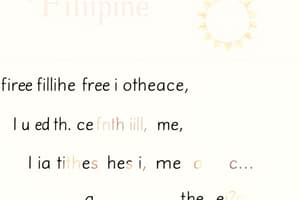Podcast
Questions and Answers
What is one primary characteristic that distinguishes riddles from proverbs?
What is one primary characteristic that distinguishes riddles from proverbs?
- Riddles are often written in a rhyming scheme.
- Riddles demand an answer from the audience. (correct)
- Riddles are meant to provide practical observations.
- Riddles are serious in nature.
Which term best describes the nature of Filipino folk songs?
Which term best describes the nature of Filipino folk songs?
- Informal expressions of ancestral life experiences. (correct)
- Riddles used to test knowledge.
- Structured narratives of historical events.
- Formal expressions of war.
What type of stories are Tales often referred to as?
What type of stories are Tales often referred to as?
- Proverbs.
- Myths and legends. (correct)
- Poems.
- Fables.
What aspect of epics is commonly emphasized regarding the hero?
What aspect of epics is commonly emphasized regarding the hero?
Which of the following is NOT a typical theme found in Filipino folk songs?
Which of the following is NOT a typical theme found in Filipino folk songs?
What do riddles often suggest with their flippant nature?
What do riddles often suggest with their flippant nature?
What is a common purpose of tales in Filipino culture?
What is a common purpose of tales in Filipino culture?
Which characteristic is usually associated with the female figure in Filipino epics?
Which characteristic is usually associated with the female figure in Filipino epics?
Flashcards are hidden until you start studying
Study Notes
Proverbs
- Proverbs are practical observations and life philosophies, typically written in rhyme.
- They serve both entertainment and education, teaching basic survival skills in local culture.
- In Filipino culture, proverbs are referred to as salawikain.
Riddles
- Riddles, known as bugtong in Filipino, are similar to proverbs but require answers.
- They are often used in contests to test one’s cleverness among participants of all ages.
- Filipino riddles possess a humorous appearance but often reveal deeper, serious meanings upon resolution.
Folksongs
- Folksongs are informal musical expressions reflecting the life experiences of ancestors.
- These songs encompass various themes, including courtship (such as serenades), lullabies, harvest celebrations, and funeral rites.
Tales
- Tales, also known as myths and legends, narrate the origins of places, names, and cultural phenomena.
- They often explain events or natural occurrences through the lens of ancestral understanding and beliefs.
- Examples include myths surrounding natural landmarks like Mount Makiling and heroes like Bernardo Carpio.
Epics
- Epics are lengthy poems chronicling the adventures and challenges faced by a legendary hero.
- These hero figures typically embody ideal qualities valued by ancestors and possess superhuman abilities.
- Romantic elements often feature a beautiful maiden, with the hero battling for her love.
- Supernatural aspects may be included to highlight the hero's extraordinary powers.
- An example of a prominent Filipino epic is Hinilawod from Negros.
Studying That Suits You
Use AI to generate personalized quizzes and flashcards to suit your learning preferences.




